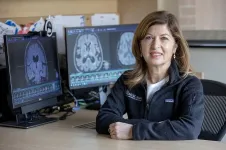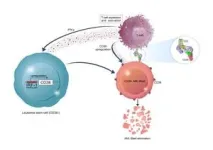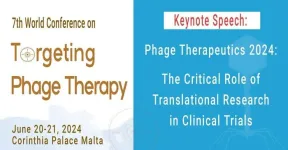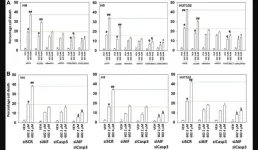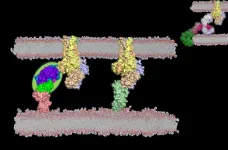(Press-News.org) As the years add up, it's common to notice slight changes in our ability to remember and think. Older people who have more marked changes than their peers can be diagnosed with mild cognitive impairment (MCI). Currently, we can’t easily predict which of these patients will develop Alzheimer’s disease and which will not.
“It's hard to predict which patients will have a more rapid progression and receive a diagnosis of dementia,” said Maria Vittoria Spampinato, M.D., division director of Neuroradiology at the Medical University of South Carolina.
“It’s important to know who is likely to progress to dementia, as they will need a lot of support and assistance from their family and other caregivers,” she continued.
To improve our ability to predict progression to AD, Spampinato and her team looked at the connection between neuropsychiatric symptoms (NPS), such as worsened anxiety and depression, and the journey from MCI to dementia, specifically AD. Their findings, recently reported in the Journal of Alzheimer’s Disease, show that NPS is a useful model for predicting progression to AD.
Alzheimer's disease can be described as a glitch in the brain's communication system. The brain “glitches” because certain proteins clump abnormally, disrupting brain function. The two main types of clumping proteins are beta-amyloid plaques and tau tangles. These proteins can disrupt brain function by forming between or within neurons, leading to memory loss, problem-solving issues and, ultimately, difficulty completing daily tasks.
Spampinato and her team hoped to find out if NPS could be a simple and noninvasive method for tracking disease progression.
“Although it’s important to do lab testing to measure the number of amyloid plaques and tau disease, NPS testing is important in identifying which patients are at greater risk,” she said.
To test whether NPS could help to predict MCI to AD progression, the MUSC team identified 300 MCI patients ages 65 and older from the Alzheimer’s Disease Neuroimaging Initiative database. Patients were given the Neuropsychiatric Inventory (NPI) to document symptoms, such as anxiety, depression, delusions, hallucinations, abnormal movement behavior and sleep disorders — collectively known as NPS — as potential early signs of preclinical AD to establish a prediction model for AD.
The study findings showed that more than a quarter of the MCI patients went on to develop AD. For each one-point increase in NPI score, there was a 3% increase in the risk of mental decline leading to the diagnosis of AD.
Surprisingly, the study showed that NPS predicted the risk of mental decline better than certain established risk factors of AD.
Based on these findings, Spampinato recommends that MCI patients be screened for NPS, as it is an important factor to consider for predicting disease progression.
“If you feel down or anxious and you experience memory issues as you age, it is important to seek help early and get a thorough evaluation for both cognitive and mental health concerns,” said Spampinato.
The prediction model developed by Spampinato and her team shows promise for identifying which patients with MCI will progress to AD. However, it will need validating in a larger group of patients recruited from memory care institutions before being used in the clinic.
The study’s findings emphasize the importance of considering NPS in the early diagnosis and treatment of preclinical AD. They also set the stage for future research aimed at unraveling the mechanisms underlying the progression from MCI to AD.
# # #
About Medical University of South Carolina
Founded in 1824 in Charleston, MUSC is the state’s only comprehensive academic health system, with a unique mission to preserve and optimize human life in South Carolina through education, research and patient care. Each year, MUSC educates more than 3,200 students in six colleges – Dental Medicine, Graduate Studies, Health Professions, Medicine, Nursing and Pharmacy – and trains more than 900 residents and fellows in its health system. MUSC brought in more than $300 million in research funds in fiscal year 2023, leading the state overall in research funding. MUSC also leads the state in federal and National Institutes of Health funding. For information on academic programs, visit musc.edu.
As the health care system of the Medical University of South Carolina, MUSC Health is dedicated to delivering the highest-quality and safest patient care while educating and training generations of outstanding health care providers and leaders to serve the people of South Carolina and beyond. Patient care is provided at 16 hospitals (includes owned or governing interest), with approximately 2,700 beds and four additional hospital locations in development, more than 350 telehealth sites and nearly 750 care locations situated in all regions of South Carolina. In 2023, for the ninth consecutive year, U.S. News & World Report named MUSC Health University Medical Center in Charleston the No. 1 hospital in South Carolina. To learn more about clinical patient services, visit muschealth.org.
MUSC has a total enterprise annual operating budget of $5.9 billion. The nearly 26,000 MUSC family members include world-class faculty, physicians, specialty providers, scientists, students, affiliates and care team members who deliver groundbreaking education, research, and patient care.
END
Neuropsychiatric symptoms predict which patients with mild cognitive impairment develop Alzheimer’s disease.
Medical University of South Carolina researchers report in the Journal of Alzheimer’s Disease that worsened anxiety, depression and other neuropsychiatric symptoms predict progression from mild cognitive impairment to full-blown Alzheimer's disease.
2024-02-26
ELSE PRESS RELEASES FROM THIS DATE:
Resurrecting niobium for quantum science
2024-02-26
For years, niobium was considered an underperformer when it came to superconducting qubits. Now scientists supported by Q-NEXT have found a way to engineer a high-performing niobium-based qubit and so take advantage of niobium’s superior qualities.
When it comes to quantum technology, niobium is making a comeback.
For the past 15 years, niobium has been sitting on the bench after experiencing a few mediocre at-bats as a core qubit material.
Qubits are the fundamental components of quantum devices. One qubit type relies on superconductivity to process information.
Touted for its superior qualities as a superconductor, niobium was always a promising ...
Long-term data reveals SARS-CoV-2 infection and vaccine-induced antibody responses are long-lasting
2024-02-26
A long-term analysis conducted by leading microbiologists at the Icahn School of Medicine at Mount Sinai reveals that antibody responses induced by COVID-19 vaccines are long-lasting. The study results, published online in the journal Immunity on February 22, challenge the idea that mRNA-based vaccine immunity wanes quickly.
The emergence of SARS-CoV-2, the virus that causes COVID-19, in late 2019 sparked the global pandemic that is now in its fifth year. Vaccines that were developed at record speed have saved millions of lives. However, the emergence of SARS-CoV-2 variants and waning immunity have decreased ...
Shaping the future of phage therapy: The 7th World Conference on Targeting Phage Therapy in Malta aims to transform clinical trials through translational research
2024-02-26
The 7th World Conference on Targeting Phage Therapy 2024, two-day event dedicated to advancing the field of phage research and therapy will be hosted at Corinthia Palace Malta on June 20-21.
Robert T. Schooley, M.D., Professor of Medicine at the University of California, San Diego, Co-Director of the Center for Innovative Phage Applications and Therapeutics, and member of the Executive Committee for the University of California Disaster Resilience Network, will introduce the messages and strategies behind phages therapy 2024.
His talk titled “Phage Therapeutics 2024: Essential Translational Research Components for ...
GZ17-6.02 with bexarotene kills mycosis fungoides cells
2024-02-26
“The present studies were performed to extend our knowledge of GZ17-6.02 biology from that known in solid tumor cell types such as prostate cancer cells to liquid tumor cell types, for example, mycosis fungoides.”
BUFFALO, NY- February 26, 2024 – A new research paper was published in Oncotarget's Volume 15 on February 8, 2024, entitled, “GZ17-6.02 interacts with bexarotene to kill mycosis fungoides cells.”
In this new study, researchers Michael R. Booth, Laurence Booth, Jane L. Roberts, Cameron West, and Paul Dent from Virginia Commonwealth University and Genzada Pharmaceuticals investigated the therapeutic agent GZ17-6.02, composed of curcumin, ...
University of Tennessee Health Science Center professor awarded $1.5m to study 'root causes' of disparity in breast cancer survival of Black women and white women
2024-02-26
Memphis, Tenn. (February 26, 2024) – Shelley White-Means, PhD, a professor of Health Economics in the Department of Interprofessional Education and the director of the Consortium for Health Education, Economic Empowerment and Research (CHEER) at UT Health Science Center, recently received a $1.5 million, four-year grant from the National Institute on Minority Health and Health Disparities to explore the root causes of the disparity in breast cancer survival of Black women compared to white women.
Dr. White-Means and a team will look beyond the social determinants of health to explore what she terms “the intersectionality of race, ...
Steering and accelerating electrons at the microchip scale
2024-02-26
Stanford researchers are getting closer to building a tiny electron accelerator based on “accelerator-on-a-chip” technology with broad potential applications in studying physics as well as medical and industrial uses.
The researchers have demonstrated that a silicon dielectric laser accelerator, or DLA, can now both speed up and confine electrons, creating a focused beam of high-energy electrons. “If the electrons were microscopic cars, it’s as if, for the first time, we’re steering and we have our foot on the gas,” said Payton Broaddus, PhD ’23 in electrical engineering and the lead author on a paper published on ...
City of Hope scientists devise novel strategy to seek and destroy leukemia stem cells
2024-02-26
FINDINGS
Scientists at City of Hope, one of the largest cancer research and treatment organizations in the United States, have devised an innovative approach to target and destroy hard-to-kill leukemia stem cells. The journal Blood published the preclinical findings today.
By overcoming challenges, such as drug resistance and treatment relapse common to patients with acute myeloid leukemia (AML), the therapy method could provide a less toxic and more effective approach for older and sicker patients who don’t quality for stem cell transplants — currently the only cure for AML available.
Type II interferon (IFNy), a substance produced by immune cells, disrupts ...
Laser-focused look at spinning electrons shatters world record for precision
2024-02-26
NEWPORT NEWS, VA – Scientists are getting a more detailed look than ever before at the electrons they use in precision experiments.
Nuclear physicists with the U.S. Department of Energy’s Thomas Jefferson National Accelerator Facility have shattered a nearly 30-year-old record for the measurement of parallel spin within an electron beam – or electron beam polarimetry, for short. The achievement sets the stage for high-profile experiments at Jefferson Lab that could open the door to new physics discoveries.
In a peer-reviewed ...
BU researchers identify potential new subtype of chronic traumatic encephalopathy
2024-02-26
FOR IMMEDIATE RELEASE, February 26, 2024
Contact: Gina DiGravio, 617-358-7838, ginad@bu.edu
BU Researchers Identify Potential New Subtype of Chronic Traumatic Encephalopathy
One in six cases have a distinct distribution of disease, clinical profile
(Boston)—Chronic traumatic encephalopathy (CTE) is a neurodegenerative disease defined by abnormal tau protein accumulating in a particular pattern in specific regions of the brain.
Studies to-date suggest CTE begins in the outermost layer of the frontal lobe, the neocortex, where it then spreads to connected brain regions. Later, in high-stage disease, ...
BU researchers describe new technological platform to accelerate drug development
2024-02-26
EMBARGOED by Cell until 11 am ET Feb. 26, 2024
Contact: Gina DiGravio, 617-358-7838, ginad@bu.edu
BU Researchers Describe New Technological Platform to
Accelerate Drug Development
(Boston)— Drug development is currently an extremely long, expensive and inefficient process. Findings generated in a lab are often very hard to replicate once translated into animal models or in humans.
A family of pharmacological targets, on which approximately 35% of FDA-approved drugs work, consists of receptors at the surface ...
LAST 30 PRESS RELEASES:
ASU researchers showcase scalable tech solutions for older adults living alone with cognitive decline at AAAS 2026
Scientists identify smooth regional trends in fruit fly survival strategies
Antipathy toward snakes? Your parents likely talked you into that at an early age
Sylvester Cancer Tip Sheet for Feb. 2026
Online exposure to medical misinformation concentrated among older adults
Telehealth improves access to genetic services for adult survivors of childhood cancers
Outdated mortality benchmarks risk missing early signs of famine and delay recognizing mass starvation
Newly discovered bacterium converts carbon dioxide into chemicals using electricity
Flipping and reversing mini-proteins could improve disease treatment
Scientists reveal major hidden source of atmospheric nitrogen pollution in fragile lake basin
Biochar emerges as a powerful tool for soil carbon neutrality and climate mitigation
Tiny cell messengers show big promise for safer protein and gene delivery
AMS releases statement regarding the decision to rescind EPA’s 2009 Endangerment Finding
Parents’ alcohol and drug use influences their children’s consumption, research shows
Modular assembly of chiral nitrogen-bridged rings achieved by palladium-catalyzed diastereoselective and enantioselective cascade cyclization reactions
Promoting civic engagement
AMS Science Preview: Hurricane slowdown, school snow days
Deforestation in the Amazon raises the surface temperature by 3 °C during the dry season
Model more accurately maps the impact of frost on corn crops
How did humans develop sharp vision? Lab-grown retinas show likely answer
Sour grapes? Taste, experience of sour foods depends on individual consumer
At AAAS, professor Krystal Tsosie argues the future of science must be Indigenous-led
From the lab to the living room: Decoding Parkinson’s patients movements in the real world
Research advances in porous materials, as highlighted in the 2025 Nobel Prize in Chemistry
Sally C. Morton, executive vice president of ASU Knowledge Enterprise, presents a bold and practical framework for moving research from discovery to real-world impact
Biochemical parameters in patients with diabetic nephropathy versus individuals with diabetes alone, non-diabetic nephropathy, and healthy controls
Muscular strength and mortality in women ages 63 to 99
Adolescent and young adult requests for medication abortion through online telemedicine
Researchers want a better whiff of plant-based proteins
Pioneering a new generation of lithium battery cathode materials
[Press-News.org] Neuropsychiatric symptoms predict which patients with mild cognitive impairment develop Alzheimer’s disease.Medical University of South Carolina researchers report in the Journal of Alzheimer’s Disease that worsened anxiety, depression and other neuropsychiatric symptoms predict progression from mild cognitive impairment to full-blown Alzheimer's disease.
